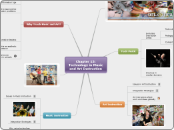jonka Catherine Sandusky 11 vuotta sitten
252
Chapter 15
The chapter delves into the significance of incorporating music and art into educational curricula, emphasizing their role in fostering creative leadership and providing aesthetic balance.

jonka Catherine Sandusky 11 vuotta sitten
252

Lisää tämän kaltaisia
The Five Areas of Support:
-Music composition and production
-Music performance
-Self-paced learning and practice
-Teaching music history
-Interdisciplinary strategies
Some issues that arise include the new definition of music literacy in different types of schools, teachers meeting standards, the encorporation of popular music and technology, and the role of music directors.
Strategies for Technology Integration
-Assessing examples in the classroom
-Using technological examples and materials
-Producing and manipulating digital images
-Graphic design and 3D modeling
-Desktop publishing with graphics
-Virtual field trips
-Movies as an art form
-Computerized kilns
-Sharing work virtually
-Web-enrichment activities
Some of the issues that arise in art education are lack of funding, the ethics of certain artists and images, what images are used, and teachers meeting standards set for art education.